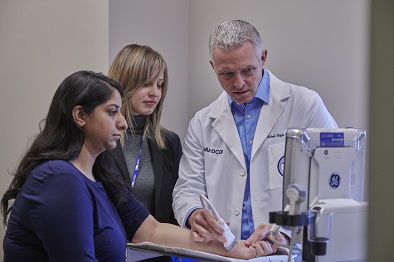The LMU DMS curriculum includes several resources that will allow students the opportunity to claim over 200 hours of CME credit.

The Doctor of Medical Science (DMS) degree program allows the physician assistant to focus his/her advanced medical education on the study of Primary Care Medicine, Internal Medicine, Emergency Medicine, or Medical Education. Students also have the option of completing more than one cognate. If interested in pursuing two or more cognates, contact our admissions office at dmsadmissions@lmunet.edu. Emergency Medicine and Internal Medicine options are offered contingent on enrollment numbers.
Our curriculum advances the students' medical knowledge through scenario-based collaboration, problem-solving, and diagnostic activities. Anatomy, pharmacology, and radiology are appropriate to the topic and integrated into the nine core curriculum modules.
Core Modules: Neurology; Psychiatry; Pulmonology; Nephrology; Cardiology; Endocrinology; Rheumatology; Gastroenterology; Infectious Disease.
Ultrasound: We offer 45 hours of unparalleled hands-on ultrasound training and advanced imagining by a board-certified radiologist.
A physician assistant must be skilled in problem-solving and demonstrate expertise in diagnosis. The DMS curriculum will advance the students’ medical knowledge and provide an opportunity for students to collaborate with physician experts for the advancement of problem-solving skills and diagnosis. The emphasis will be on educating clinicians to address primary care medicine in all health care settings and will employ the distinctive medical model for the maintenance of health and treatment of disease.
Medical Cognate Options: Primary Care Medicine, Internal Medicine, Emergency Medicine
In addition to the above medical fields, the DMS program offers a general medicine cognate option for new PA graduates. See the DMS New Grad Pathway to learn more about the general medicine cognate.
All medical cognates and core modules are taught by board-certified, experienced physicians with multiple years of experience in their field.
In the Medical Education Cognate option, the curriculum, instruction, and assessment strategies help those who are teaching (or who aspire to teach) improve their effectiveness while implementing constructivist, student-centered (competency) instructional models. We model what we teach, in how we teach, so the students (who are teachers themselves) can experience these methods and strategies from their students’ perspectives and, at the same time, learn what those strategies look like from a teacher’s perspective.
We study and incorporate newer digital technologies and discuss their potential to change the nature of medical education. Students who have completed the Medical Education Cognate report they began to change their instructional practices well before they finished the Cognate and did not realize when they first enrolled, how much they would learn, and how many skills they would gain.
The LMU DMS curriculum includes several resources that will allow students the opportunity to claim over 200 hours of CME credit.

Part-Time Plan (Summer Start)
Full-Time Plan (Fall Start)
Custom Plan (Spring Start)